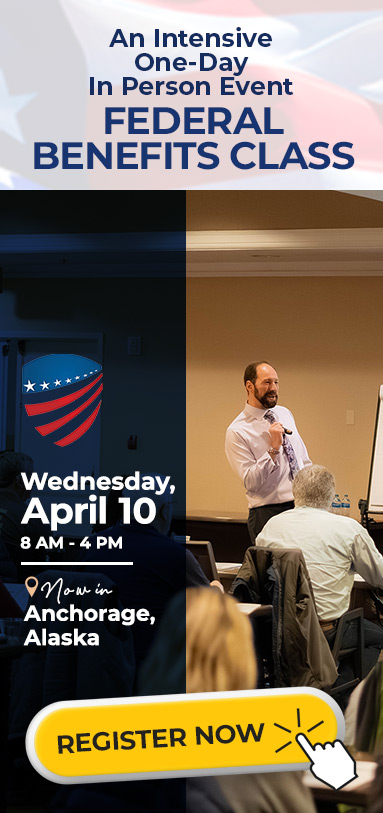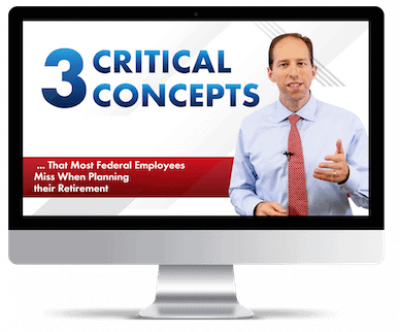How Will Your Federal Retirement Benefits Be Taxed?
Many people simply forget – or perhaps just don’t understand the taxation of federal retirement benefits.
Taxes will have a big impact on your federal retirement. And if you forget to factor taxes into your retirement plans, you could be in for a shock.
Taxes and Your Federal Retirement
Taxes have a huge impact on federal retirees.
One of the common misconceptions I see involves the taxation of federal retirement benefits.
Federal employees sometimes forget that their federal retirement pension *is* taxable. Your CSRS or FERS Pension will be taxed at ordinary income tax rates.
Now – you will get your contributions back tax-free (since you already paid taxes on the money when it was taken out of your pay check).
But many federal employees are surprised that for tax purposes,their contributions are stretched out over their life expectancy.
Years ago – your contributions would come back to you first. So many federal retirees would have about two years of tax-free income from their CSRS or FERS pension. But now the government considers your contributions to be stretched (amortized) over your life expectancy.
What Does This Mean to You?
This means that the majority of your federal retirement pension income will be subject to income taxes.
Everyone’s contributions will be different, and CSRS will have a higher contribution than FERS.
In my experience – your contributions usually amount to about 2% to 5% of your annual pension income for FERS and about 5% to 10% for CSRS.So that means that about 90% to 98% of your FERS or CSRS pension will be taxable.
(For more detailed information about the taxation of Federal Retirement Benefits and to see how your tax-free portion of your pension/annuity is figured – see IRS Pub 721 )
So most of your FERS or CSRS retirement pension will be taxable.
There’s a good chance your Social Security benefit will be taxed – depending on your income (and the income thresholds are shockingly low.)
And of course you know that the money you take out of your Thrift Savings Plan (TSP) account will be taxable.
So you can see that taxes have a significant impact on federal employees in retirement.
But time after time, I see federal employees who forgot to figure taxes into their retirement planning.
Let’s look at what might happen if you forget to factor the taxation of federal retirement benefits into your planning…
Taxation of Federal Retirement Benefits: Let’s Look at an Example…
Say you and your spouse are expecting to live on $5,000 a month in retirement. And here’s how you plan to come up with that money:
Your Federal Pension of $1,500 a month
Social Security benefit of $1,200 a month
You’ll take $1,000 a month from your TSP
Your Spouse has a pension from their job of $800 a month
And you’ll take $500 a month from your spouse’s 401(k)
You estimate your retirement income to be $5,000 a month… but you forgot to figure in taxes.
***Please keep in mind this is just an example to demonstrate the impact of taxes. Everyone’s tax situation is unique, and there are often many other factors that affect your tax liability.***
Let’s say for our example that you might owe about $400 a month in taxes.
So instead of $5,000 a month, you’re really getting $4,600 a month.
If You Forget to Factor in Taxes…
If you forgot to consider the taxation of federal retirement benefits into your retirement planning – something’s going to have to give.
Uncle Sam wants – and will get his pound of flesh.
At first glance, living on $4,600 a month instead of $5,000 a month might not seem like such a big difference. And perhaps you could get by on less. But do you really want to?
And what if you really did need $5,000 a month to live on in retirement. Where is the extra money going to come from?
Most likely the extra money would be taken out of your TSP or perhaps a spouse’s 401(k) plan.
Now if you need an extra $400 a month (which would be $4,800 each year) – how much will you have to take out of your TSP?
The answer – not $4,800 – but closer to $5,600.
***Please keep in mind this is just an example to demonstrate the impact of taxes. Everyone’s tax situation is unique, and there are often many other factors that affect your tax liability.***
Remember that money taken out of your TSP (or a 401(k) plan) is taxed when you take it out. So instead of an extra $4,800 a year coming out of your TSP, you’ll be drawing $5,600 a year to account for the taxes that you’ll owe on that money too.
How will this affect your retirement planning? Are you still sure that you can make your money last your entire life?
If you forgot to figure taxes into your retirement planning – you’ll either have to take more money out of your accounts now – and possibly risk having to go back to work – or reduce your retirement lifestyle. Will it be one less vacation? What will you have to give up?
These are issues I don’t want my clients to worry about. We make sure we consider the taxes they’ll owe in retirement when we develop their financial and retirement plans.
But there’s another level to tax planning – one that most people never even think about…
The Next Level of Tax Planning
In the federal retirement classes I teach, the taxation of federal retirement benefits is just one of the topics we cover – because it has such a huge impact on your retirement.
In class, I’ll ask people, “Where do you think tax rates are going in the future, up or down?”
Most of the people in the class think that taxes will be going up.
So the next question I ask is, “If you think taxes will be going up in the future – what are you doing about it now?”
People will say, “But I can’t control whether taxes go up or down.”
To which I reply, “Right, but you can control your tax bracket.”
“What?”
“You can control your tax bracket – if you plan ahead – and you know what you’re doing.”
Think about this – if all of your retirement money is in tax-deferred accounts, you will have to pay taxes on the money as you take it out in retirement. So what happens when tax rates go up? You’ll pay more in taxes.
But what if you planned ahead? What if you had money available from a variety of sources that were taxed at rates lower than ordinary income tax rates – or were tax-free?
You would be in a position to decide from which accounts you would take the money – and thereby decide how much you would be paying in taxes.
A Word of Caution
Tax planning can be immensely beneficial – when it’s done correctly.
We have helped many of our clients position their money in ways that put them in control of their retirement taxes – and in the process saved them big bucks.
But don’t mess around with tax planning if you don’t thoroughly understand the tax code.
If you’re interested in tax planning – you *MUST* find a professional who is thoroughly familiar with the tax code.
Look for a professional who has experience with taxation of Federal Retirement benefits. And – you must find a professional who is above board and isn’t dabbling in any grey areas.
And just because someone has a bunch of letters behind their name doesn’t guarantee they know anything about taxes.
Understanding the Taxation of Federal Retirement Benefits
We’ve just talked about some of the basics when it comes to taxes and your Federal Retirement.
If you haven’t already, you might want to check out IRS Pub 721
Make sure you understand the taxation of Federal Retirement benefits – and be sure to consider taxes when you are planning your retirement.
If you don’t understand federal taxes – you should find a professional who does.
Are You Getting The Most Out of Your Federal Benefits?
Federal retirement benefits are complex. You’ve devoted years, probably decades of your life to your federal career. Make sure you understand your federal benefits *before* you retire.
We seen the mistakes that people (and even some professionals!) can make, and we want to help you avoid them. Click the button below to learn more.
7 CRITICAL MISTAKES
Federal Employees make
✗ Forgetting to check your beneficiary designations
✗ Expecting pension check to arrive in 30 days after retiring
✗ Not knowing the difference between SCD vs. RSCD
✗ Completing retirement paperwork incorrectly
✗ Failing to prepare financially for retirement
✗ Failing to understand tax consequences
✗ Getting bad advice
Click the button below and learn how to avoid these mistakes while planning YOUR retirement









![live127123 [Converted] 1-01 live127123 [Converted] 1-01](https://plan-your-federal-retirement.com/wp-content/uploads/elementor/thumbs/live127123-Converted-1-01-qlhfxt1jl8nai44kz1xk5u4shejeynh2t7i0txhx7c.png)